
By Allison Kugel
Wine X Online Edition
Actor, director, and New York Times bestselling author, Andrew McCarthy is best known for coming-of-age movies like St. Elmo’s Fire, Pretty in Pink, and Less Than Zero that made an entire generation feel heard and seen and cementing his place within the pop culture zeitgeist as part of a larger than life group of then famous young actors known as The Brat Pack. The notorious moniker, coupled with sudden fame in his early twenties, made
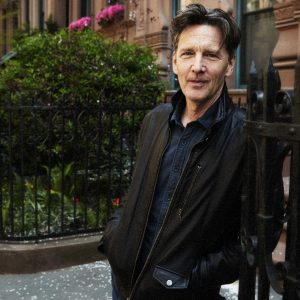
NEW YORK, NY – APRIL, 20: American actor, television director and author Andrew McCarthy, is captured in his home neighborhood of Greenwich Village New York, NY on April 20, 2021. McCarthy’s new memoir “BRAT: An 80’s Story” is due out soon. (Photo by Jesse Dittmar for The Washington Post)
McCarthy retreat and re-think his place in the world. Attempting to defy expectations, he went on to try his hand at comedy in quirky films like Mannequin opposite Kim Cattrall and the Weekend at Bernie’s movies with co-stars Jonathan Silverman and Terry Kiser, who played the title role.
Still restless in spirit, ultimately, McCarthy opted to make the bold move of traveling to Spain to walk the Camino de Santiago trail, which extends clear across the northern border of Spain. It was on that trip in his early thirties that he was able to put his sudden fame into perspective as he experienced an awakening and a sense of personal accomplishment that eluded him in the height of his movie stardom.
In his 2021 memoir, Brat: an ‘80s story (Grand Central Publishing), McCarthy revisits signpost moments from his childhood, through his early years in New York, the sensational movie stardom of the Brat Pack years, his journey to sobriety and complicated family dynamics; particularly with his father.
Enjoying a renaissance in his acting career, the celebrated actor, television director and New York Times bestselling author, revisits the Camino de Santiago in Spain with his eldest son, Sam, and chronicles the life changing experience had by father and son in his new book, Walking with Sam: A Father, A Son and Five Hundred Miles Across Spain (Grand Central Publishing), out now.
Allison Kugel: In the prologue of your new book, Walking with Sam: A Father, a Son, and Five Hundred Miles Across Spain, you talk about your first time walking the Camino de Santiago Trail in Spain in your younger years and how it was sort of a spiritual re-balancing for you after living through the Brat Pack years of your career. You say that at the time you felt you hadn’t earned your accomplishments, meaning your early movie stardom. Why didn’t you earn your accomplishments?
Andrew McCarthy: Good question. I didn’t know it was a spiritual rebalancing [at the time]. I never phrased it like that, but I think that is actually what happened, and I was aware that I needed something, I guess. I’m not sure what it was. I’m not sure how I ended up at the Camino back then, but I guess I was young and I became very successful very quickly; and I felt what people now call “Imposter Syndrome,” or something like that.
Allison Kugel: Yes, there’s a buzz term for everything these days.
Andrew McCarthy: Exactly. I guess I felt unprepared and I felt unseen. I was seen in a certain way, and I wasn’t sure that’s who I was. When you’re young, you’re not sure who you are yet, so to be seen and pegged in a certain way, I thought, “Wait, this isn’t quite accurate to who I am.” Once the Brat Pack stuff came about and I was lumped in with a group of people, I initially didn’t like it. I didn’t want to be labeled and stigmatized, or pigeonholed. I think when you are young and an actor you don’t want to be grouped into anything. You want to be an individual. In the decades since that time, it’s become an affectionate term, “The Brat Pack,” for a moment in pop culture in the ‘80s when I became this avatar for people’s youth for a certain generation. But when I was young, I think I felt like “What just happened? I don’t even have my feet under me yet.”
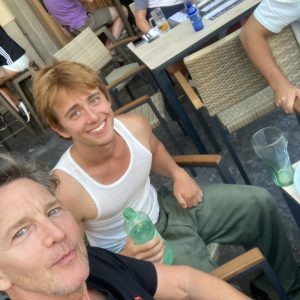 Allison Kugel: Yes, you hadn’t processed it yet. Ironically, “The Brat Pack” the young actors that were lumped into that group were all really, really talented people. I mean, you were all really talented young actors. I would take pride in that.
Allison Kugel: Yes, you hadn’t processed it yet. Ironically, “The Brat Pack” the young actors that were lumped into that group were all really, really talented people. I mean, you were all really talented young actors. I would take pride in that.
Andrew McCarthy: It has certainly become that over the decades, but at the time we did not view it that way. And there are a lot of talented people who are still, all these years later, still chugging away at it.
Allison Kugel: So, decades later, in present day, you decide it’s time for a full circle moment, and you take your eldest son, Sam, to do the same walk across Spain that you initially did as a young man. How old were you when you took this first walk across the Camino de Santiago in Spain?
Andrew McCarthy: I actually wasn’t so young. I think I was in my very early 30s. I survived that early thing called fame and was not sure what I was looking for, really. Then I came across a book at a bookstore about the Camino de Santiago [trail], which I’d never previously heard of. The book was about the ancient pilgrimage route of Spain for 500 miles. There was something in that, that just spoke to me. I read the book, and a week later I said, “I’m going to Spain.” I wasn’t sure why, but I did find it to be a life changing experience. I think in a way, and I mention it in the book, there was a moment about halfway through the walk where I was in a field of weeds, and I had this sobbing tantrum. I had a revelation of how much fear had been so dominant in my life in a way that I hadn’t realized before, and it was quite a liberating moment and changed my place in the world.
Allison Kugel: And in the book you chronicle your experience walking this same trail with your son, Sam, who was how old at the time?
Andrew McCarthy: He was 19 when we went, which was a year and a half ago.
Allison Kugel: I’m sure you’ve regaled him with stories over the years of when you did this walk for the first time decades ago…
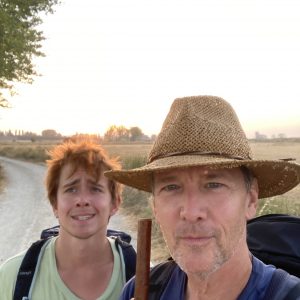 Andrew McCarthy: I tried not to regale because there is nothing more boring than, as my daughter calls it, “Here comes a dad story.” (Laugh) They had known about it their whole lives. On occasion, I mention the Camino, and they know how big of an experience it was. I’ve encouraged many people, through the years, to go do it, and everyone that has done it has also had a big life-changing experience from it. I would recommend it to anyone in a moment of transition in their life. My son was just becoming a man, and my relationship with my own father basically ended when I was 17 years old and left that house. That was the end of our relationship and I didn’t want that to happen with my kids. I wanted to figure out a way to transition our relationship to two adults, as opposed to the dominant parent talking to the kid; to sort of be equals in the world. I thought this trip would be a way to begin the transition to that happening, and it was a big experience for the both of us.
Andrew McCarthy: I tried not to regale because there is nothing more boring than, as my daughter calls it, “Here comes a dad story.” (Laugh) They had known about it their whole lives. On occasion, I mention the Camino, and they know how big of an experience it was. I’ve encouraged many people, through the years, to go do it, and everyone that has done it has also had a big life-changing experience from it. I would recommend it to anyone in a moment of transition in their life. My son was just becoming a man, and my relationship with my own father basically ended when I was 17 years old and left that house. That was the end of our relationship and I didn’t want that to happen with my kids. I wanted to figure out a way to transition our relationship to two adults, as opposed to the dominant parent talking to the kid; to sort of be equals in the world. I thought this trip would be a way to begin the transition to that happening, and it was a big experience for the both of us.
Allison Kugel: There is a funny moment in the beginning of the book where you say something to the effect of, “I think every young American really gets something profound when they visit Europe for the first time. I really hope that Sam has that same profound epiphany.” He then turns to you and says, “How come there are no Flamin’ Hot Cheetos in Europe, dad?” (Laughs)
Andrew McCarthy: These are the big questions we need answered (laugh). That was sort of an example of how expectations are going to lead to disappointment every time. You have to let people have their own experiences in their own time. We can lead them and try to force an experience on them, but people can feel that, and they are going to resist it. They need to have their own experience in things. We have no idea what their experience is going to be.
Allison Kugel: Would you say that early fame is a trauma to your system that one has to overcome and heal from? That’s kind of what I got from reading your earlier memoir, Brat: An 80s Story.
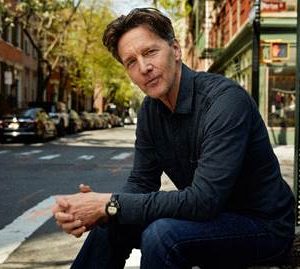 Andrew McCarthy: Trauma is a big word. There are people who do experience real trauma and being famous in movies in your early 20s doesn’t quite qualify as a trauma. It was life-altering and certainly wondrous in many ways, and overwhelming, but I don’t think it was traumatic. It took me a long time to recover from it and sort of come down and sit with it, and kind of find who I was. When you’re in your early 20s you are still trying to figure out your place in the world and who you are, and I think that sort of rocked that boat for a while. It certainly altered who I would become. But in many ways, it was a blessing, really.
Andrew McCarthy: Trauma is a big word. There are people who do experience real trauma and being famous in movies in your early 20s doesn’t quite qualify as a trauma. It was life-altering and certainly wondrous in many ways, and overwhelming, but I don’t think it was traumatic. It took me a long time to recover from it and sort of come down and sit with it, and kind of find who I was. When you’re in your early 20s you are still trying to figure out your place in the world and who you are, and I think that sort of rocked that boat for a while. It certainly altered who I would become. But in many ways, it was a blessing, really.
llison Kugel: You made another comment where you said that your early fame “blew up your dynamic with your siblings, and it was never the same from that point on.” How does fame blow up family dynamics, exactly?
Andrew McCarthy: It depends on the family. Certainly, it can bring you closer together, and you can go to family for security and council, and things like that, and it can be a place of solace. That was just not my experience. My dad was having a hard time in his life when I was getting famous, so my fortunes were rising and his were falling, and that was difficult for him. With my brothers, when we were growing up, I was never the star of the family. My older brother was the baseball star. The other one was the smart one, and I was the little sensitive kid. Then, I’m in movies and they are in their mid-twenties. They are trying to figure out their place in the world, and suddenly there goes me and I’m suddenly now American royalty. That is what movie stars were and have been; America’s royalty. I’m now this thing, and I don’t know that they ever really recovered from that.
Allison Kugel: I think it’s hard as human beings, in general, not to fall prey to the disease of comparison.
Andrew McCarthy: Yes, and drugs
Allison Kugel: Your son Sam is a working actor. He was recently on the Netflix show Dead to Me with Christina Applegate, and your daughter has appeared on Broadway. It seems you were never completely comfortable in your own skin on red carpets and in front of flashing cameras. Did you want your own kids in show business? How did that come about?
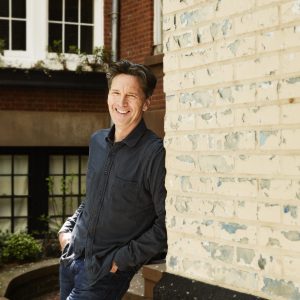
NEW YORK, NY – APRIL, 20: American actor, television director and author Andrew McCarthy, is captured in his home neighborhood of Greenwich Village New York, NY on April 20, 2021. McCarthy’s new memoir “BRAT: An 80’s Story” is due out soon. (Photo by Jesse Dittmar for The Washington Post)
Andrew McCarthy: I would say that in many ways I was more at home in front of the camera than anywhere else. I found the attention on the red carpet very nerve wracking, but I always instilled in my kids that I didn’t want them to be actors. And then God is cruel and gives us these things (laugh). In reality, acting saved my life when I was 15. I had been cut from the high school basketball team and my mother suggested I try out for a play. I didn’t want to try out for the play. I wanted to be the point guard! But I did try out for the play and was cast as the Artful Dodger in Oliver, and it changed my life. I walked out on a stage, and suddenly I knew what I was going to be. I knew that it was a profound experience because I told nobody. It was mine. I didn’t want someone to squash that before it had taken root. Because acting really saved me, if my kids want to do that, then they should. What they’ve gotten from seeing me do it is knowing it’s not a glamorous thing. You go to work, you figure out how to do it, you get up early. It is a great job, but it’s a job like other jobs, so it’s not perceived as particularly glamourous in my house. Although it is a wonderful life and career. It’s like a family business in a certain kind of way, so why shouldn’t they? After getting away from acting for a long time and recently going back to it, I felt like myself again. It they feel like themselves when they do it, fantastic.
Allison Kugel: Throughout this book, your son Sam is also very open with you about smoking cigarettes and about trying different substances. You, yourself struggled with substance abuse as a young man. And as you have explained it, you were kind of using those things as a way to kind of emotionally regulate yourself in those days. What was going on there?
Andrew McCarthy: What was I thinking there (laugh)? Of course, the first thing you feel as a parent is fear, because drugs and alcohol almost destroyed me. Of course, you’re afraid for your children in that moment. Drugs and alcohol are a slippery slope that everyone has to navigate, and everyone will experiment with and try. To pretend it’s not going to happen is foolish and sticking your head in the sand. I have just been honest with my kids since the beginning. I said the only thing that can derail your life, and it derailed mine, is drugs and alcohol. I’m a broken record with that. “But,” I’ve said, “You are going to do it, and you have it in your family, so just know that.” But again, information will never keep anybody clean and sober. Information does not stop people from doing drugs and alcohol. I’m very grateful that he would share that with me and communicate. All you want to do with people you love is to be able to communicate and connect. When you can communicate, you connect, you create intimacy, and then you have a bond. I’ve expressed, “If that is what is going on and that is what you are thinking about, talk to me about it. Obviously, I’m going to respond, because I’ve had my own history, so I have a fearful reaction when you tell me that, but I hear you, and I did have some great fun when I did it.” Nobody can smell truth and lies like your kids and it’s for them to discover.
Allison Kugel: I want to touch on Orange is The New Black, because I don’t think a lot of people know that you were a director on that series. It’s the series that really catapulted Netflix into the original content space and into what it is today.
Andrew McCarthy: That was an interesting experience. A friend of mine was a producer on it, and they couldn’t get any directors, because at the time it was on this thing called Netflix that no one understood, like doesn’t Netflix mail you DVDs? Oh, they’re doing a show? I asked, “Where is the show going to be on?” They said, “Well, they are going to stream it.” I said, “Okay fine, but what channel is it going to be on?” (Laughs) No one could understand what was going on and they couldn’t get any actors for it, because who is going to see this thing? I said, “I’ll do it.” I directed a bunch of them, and I remember the day I was in the producer’s office and they said, “They are going to put them all out on the same day.” I remember being the wise one in the room and saying, “That is the stupidest idea I’ve ever heard.”
Allison Kugel: Wisdom of the ages (laughs).
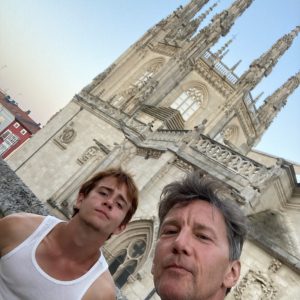 Andrew McCarthy: And of course, they all come out and Netflix takes over the world. It was a wonderful and exciting moment to be part of something like that. It caught everyone, it certainly caught me and everyone I know who was involved in it, by total surprise that this happened. The first few years of Orange is The New Black were very exciting. I think it was a very good show until the end, but after seven years it kind of settles in to what it is, and kind of loses that electric spark. But for a time, it was certainly quite something.
Andrew McCarthy: And of course, they all come out and Netflix takes over the world. It was a wonderful and exciting moment to be part of something like that. It caught everyone, it certainly caught me and everyone I know who was involved in it, by total surprise that this happened. The first few years of Orange is The New Black were very exciting. I think it was a very good show until the end, but after seven years it kind of settles in to what it is, and kind of loses that electric spark. But for a time, it was certainly quite something.
Allison Kugel: What was your favorite part of directing many episodes of Orange is The New Black?
Andrew McCarthy: Working with the actors in that most of them were very raw and very green and new. They were just thrilled to be there. Helping to sculp that and work with them was fun and exciting. There is a moment in acting, particularly when you are young and doing something for the first time; it’s that moment of discovery and that blossoming happens in real time in front of your eyes on the screen. I look back at some of my early movies and I can question some of the acting, but I certainly did have that in St. Elmo’s Fire and in Pretty in Pink. The ladies in Orange is The New Black had those moments when we were doing show. You look back at James Dean in East of Eden or Leonardo DiCaprio in What’s Eating Gilbert Grape, and you see that moment on screen. All actors experience it; this moment of blossoming is the only word I can think of.
Allison Kugel: In the acting part of your career you made movies that so many people attach to their own coming of age memories or just lots of laughter and enjoyment. With that being said, what was your favorite moment on a movie set?
Andrew McCarthy: You don’t always just remember the one’s you loved (laugh).
Allison Kugel: Well, we can talk about the ones you hated, but…
Andrew McCarthy: I loved doing the Weekend at Bernie’s movies for some reason. I hadn’t gotten the opportunity to do comedy like that and it was really fun, and there was so much of those movies that we made up as we went along. You can feel the excitement in what we were doing. It was like, this is so stupid, ridiculous, and anything goes. Let’s just do it! I also loved making St. Elmo’s Fire. That was the third or fourth movie I did, and I felt very comfortable and relaxed and was doing what I wanted to be doing. I was having a moment there, and that was nice to feel. Those two movies stand out to me for the pure joy of doing of them. I felt very present and very alive in the creation of them.
Allison Kugel: You’re also an acclaimed travel writer. This new book, Walking with Sam, is kind of a hybrid memoir and travel book. Tell me about your passion for travel and travel writing.
Andrew McCarthy: That all began with the first Camino I walked 25 or so years ago. After I walked that first Camino, I kept traveling and alone. I think traveling alone is an important thing. The farther from home I got, the more at home I felt. I kept traveling and I started writing stuff down in little notebooks. I would write down things people said to me and I did that for years and years for no intent with it except to enjoy it. One day I did have intent with it and then I met an editor of a magazine and said, “You ought to let me write for your magazine.” He said, “You’re an actor dude (laugh).” And I replied, “Yes, but I can tell a story. That’s what I do.” I wrote a travel story and it did well, and I wrote another and another and it became this sort of accidental career. I became successful at it for two reasons: I knew travel was deeply important and had a value, not something you do for Instagram photos, although they didn’t exist back then, or for bragging rights or bucket lists. Travel is a meaningful thing that can change who we are in the world, and in mind and spirit. I also knew how to tell a story, rather than selling a destination. If you love what you are doing it always shows. I felt that when I was travel writing the same way that I felt it when I was acting when I was very young. Then I started to feel it again when I was directing the ladies in Orange is The New Black. I’m helping these people create this thing. They are all kind of the same thing in my mind. Then the books grew out of all of that.
Allison Kugel: There is a quote in this book, Walking with Sam, that I just love. Towards the end of your journey you write, “Although the greater world might reasonably argue that this walk has no real purpose, that it achieves no practical goals and so it is of no merit or consequence, there is a growing awareness among us without being able to quite name it yet, that what we are doing is somehow of importance and meaning.” The reason I love that quote is because in our western culture we prize accomplishments that lead to lots of money and lots of recognition. But we don’t always value things that make our soul feel alive or help us grow. I think we need to place more emphasis on those things.
Andrew McCarthy: I think that is all true. There is no better feeling than that. I forgot about that quote, but I’m glad you bring that up, because that feeling I had was exactly that. We want money and things because it gives us a high, but that other feeling that you are quoting there is one of deep resonance internally that can’t be beat.
Allison Kugel: You’ve made no secret about the fact that you and your father did not have the best relationship. You loved your father, but your father was, as you described him, a very angry man, often brooding with mood swings when you were growing up. Do you still carry the fear of being the “bad father” with your own kids?
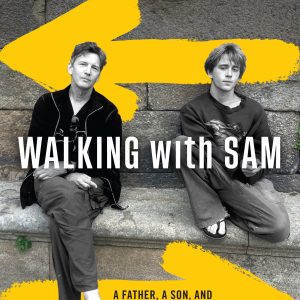 Andrew McCarthy: You are right in all of that. My relationship with my dad healed when I went to go see him when he was dying. I sat with him for those few weeks. My wife was the one that said, “You need to go see your dad.” I went because I wanted to be a better parent to my kids. I went selfishly, and to sit there with my dad and tell him I loved him and I was sorry that I wasn’t the son he wanted. To just be there and to see the fear in him that he always masked with anger, because anger feels better than fear, right? With anger you feel in control. Anger is always a mask of fear. Always. To see the fear in him was so liberating for me and to hold his hand while he was dying was a profound experience. We did not solve our past. We just dropped it and discarded it. Since he is gone, I’m very free to love him in a way that I wasn’t when he was alive, and I was so afraid of him. With my own kids, I think the Camino [trail] had a lot to do with it. Walking with Sam, both the book and the action, it freed me a lot from that. During our walk across Spain, I risked just being who I am in front of my son, as opposed to being the dad who’s got it all down. I had moments in front of him of not knowing and being a bit of a mess at times, being reactive at times and then apologizing and being vulnerable and saying, “This is who I am son.” To let him see me and I think he appreciated that, and I appreciated him perceiving me in that way, so it altered things. I feel less fear or anxiety of our relationship disintegrating the way mine did with my father. That was the whole intent of the that journey, and then consequently the book. Has it completed the job? No, but it has begun to do it to a larger degree.
Andrew McCarthy: You are right in all of that. My relationship with my dad healed when I went to go see him when he was dying. I sat with him for those few weeks. My wife was the one that said, “You need to go see your dad.” I went because I wanted to be a better parent to my kids. I went selfishly, and to sit there with my dad and tell him I loved him and I was sorry that I wasn’t the son he wanted. To just be there and to see the fear in him that he always masked with anger, because anger feels better than fear, right? With anger you feel in control. Anger is always a mask of fear. Always. To see the fear in him was so liberating for me and to hold his hand while he was dying was a profound experience. We did not solve our past. We just dropped it and discarded it. Since he is gone, I’m very free to love him in a way that I wasn’t when he was alive, and I was so afraid of him. With my own kids, I think the Camino [trail] had a lot to do with it. Walking with Sam, both the book and the action, it freed me a lot from that. During our walk across Spain, I risked just being who I am in front of my son, as opposed to being the dad who’s got it all down. I had moments in front of him of not knowing and being a bit of a mess at times, being reactive at times and then apologizing and being vulnerable and saying, “This is who I am son.” To let him see me and I think he appreciated that, and I appreciated him perceiving me in that way, so it altered things. I feel less fear or anxiety of our relationship disintegrating the way mine did with my father. That was the whole intent of the that journey, and then consequently the book. Has it completed the job? No, but it has begun to do it to a larger degree.
Allison Kugel: You were raised a Catholic, right?
Andrew McCarthy: I was raised Catholic, but I have long walked away from it. I find it shocking that the Catholic church is still in business after all of this. If any other business had done what the Catholic church did, they would be long out of business and in jail. Every one of them.
Allison Kugel: They have not fallen prey to cancel culture (laugh).
Andrew McCarthy: No. They bought their way out of that.
Allison Kugel: Organized religion aside, in quiet moments do you pray? And if so, who or what do you pray to?
Andrew McCarthy: I pray every day. But in certain ways, who or what I pray to is none of my business. I feel like if I could understand it, there wouldn’t be the thing I’m praying to. I don’t think that matters, particularly. I just feel like there is some sort of connection to something and I know it when I feel it. I’ve had moments of it in my life where I have experienced the sensation of grace. When I walked the Camino the first time and I had that moment of weakness and sobbing and realized how much fear I had in my life, it was a moment of grace that I received. There have been other moments in my life where I’ve had that happen and that didn’t come from me, or maybe it came from me. I don’t know what the difference is, but yes, I do pray. I understand why [organized] religion is valuable to people. It is just not something I find solace in. I’m not sure I’m looking necessarily for solace, anyway. I’m looking for a connection to something; to be a part of something. I often feel like I’m stumbling in the dark with it, and that is fine.
Allison Kugel: And lastly, what do you think you came into this life as Andrew McCarthy to learn, and what do you think you came here to teach?
Andrew McCarthy: The answer would be the same for both, and that is that fear is a phantom.
Andrew McCarthy’s new book, Walking with Sam: A Father, a Son, and Five Hundred Miles Across Spain (Grand Central Publishing) is out now and available wherever books are sold. Follow Andrew McCarthy on Instagram @andrewtmccarthy
Allison Kugel is an entertainment journalist, syndicated columnist, frequent Wine X contributor, and host of the Allison Interviews Podcast. Watch and embed the entire interview video with Andrew McCarthy @YouTube. Listen to the audio podcast on Apple Podcasts or Spotify. Follow Allison Kugel on Instagram @theallisonkugel and at AllisonInterviews.com.




